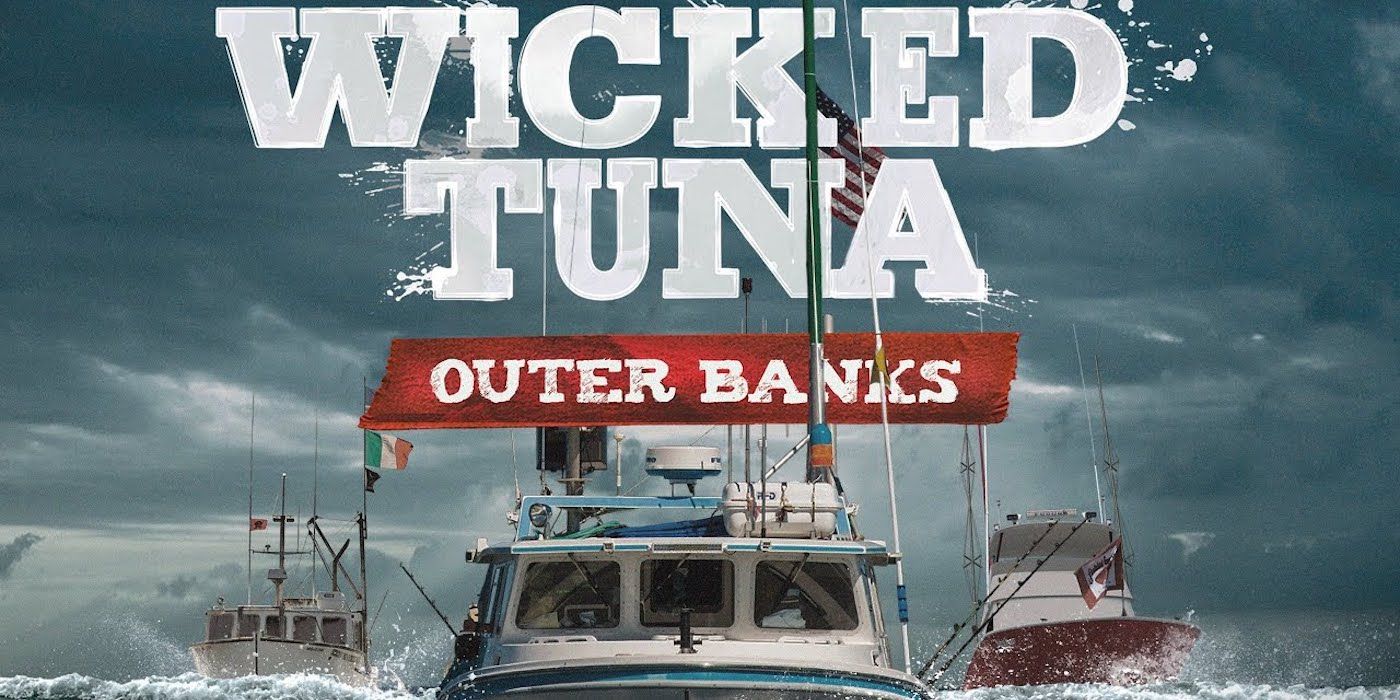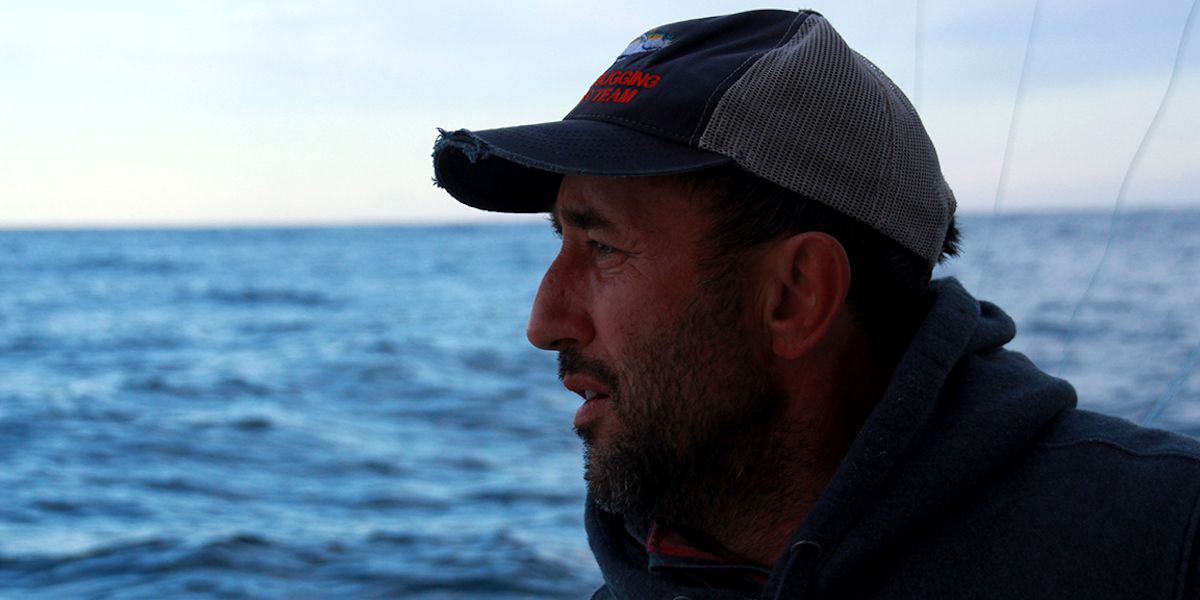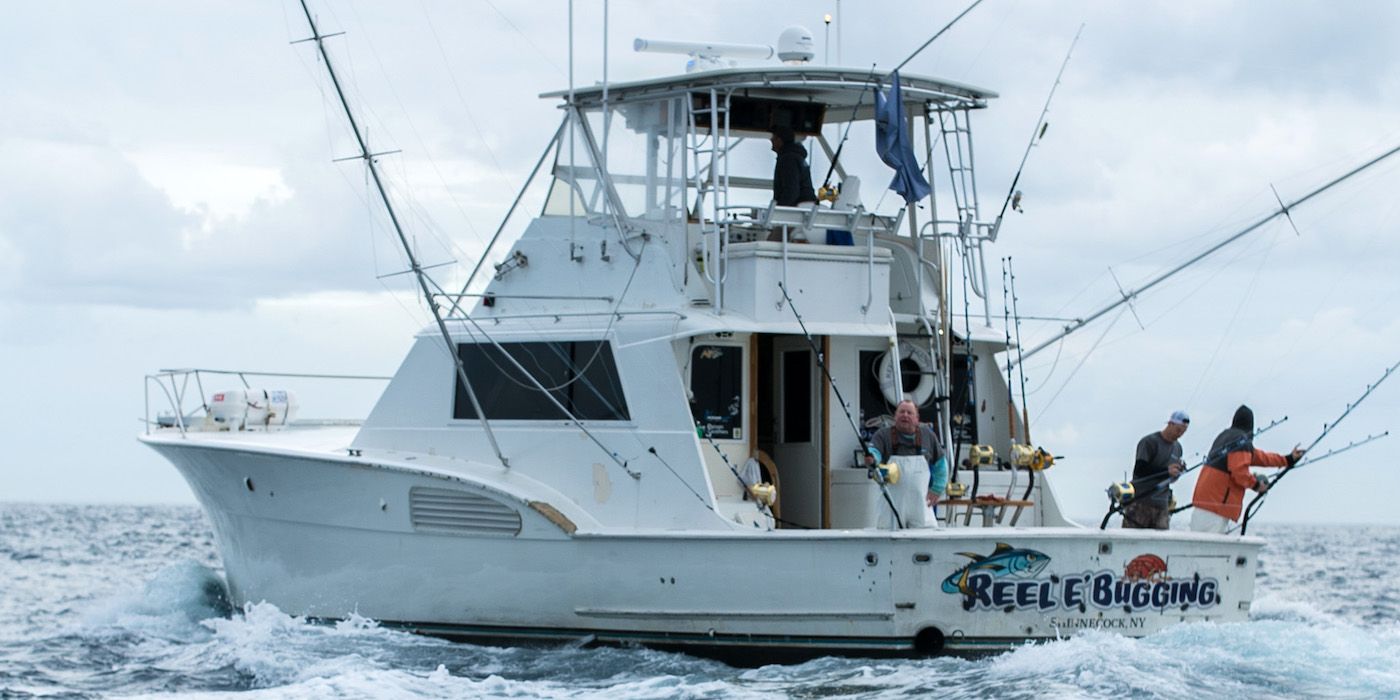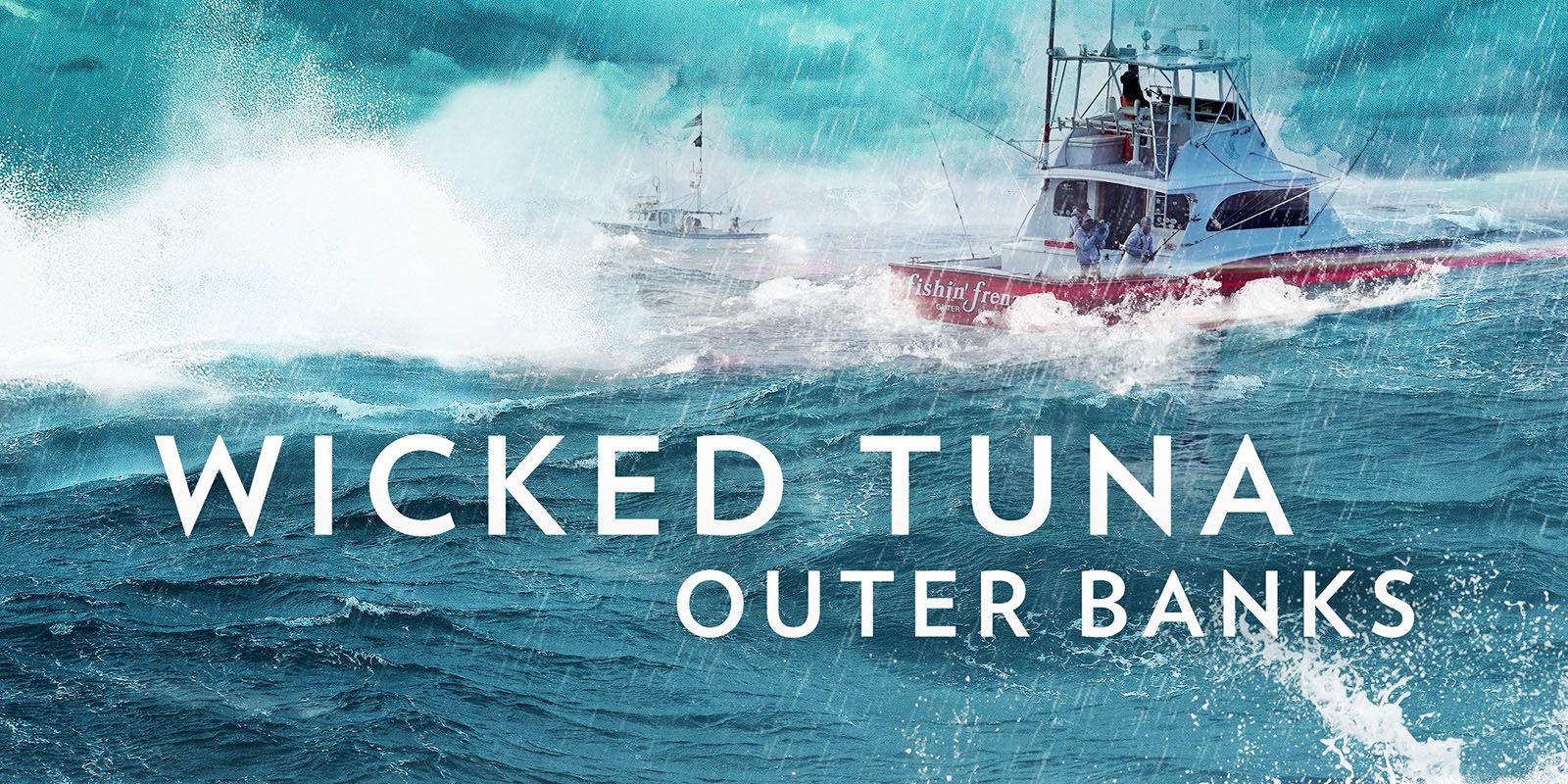
The sea is an unforgiving place, but it makes for tremendous television. Such is the premise of Nat Geo's Wicked Tuna: Outer Banks, which follows fishermen and their crews as they ply their trade, doing what they must to literally and figuratively keep their heads above water.
Captain Bobby Earl of the ship Reel E' Bugging was born to fish, but it took him a little while to realize it. The Bayside, Queens native spent the better part of 30 years wearing a suit and tie on Wall Street before the 2008 financial crash forced him to rethink his prospects. First, he tried his hand at the bed bug extermination business, but he would spend four months out of the year fishing in North Carolina's Outer Banks. Eventually, he passed the bed bug business on to his son, became a full-time fisherman, and never looked back.
While promoting the new season of Wicked Tuna: Outer Banks, Bobby Earl spoke to Screen Rant about his work on the show, his unique trajectory through life, and what audiences can expect from the new batch of episodes. He also discusses last year's unfortunate incident, an engine room fire that claimed Reel E' Bugging. Today, the old boat is lost underneath 200 feet of water. The new ship for the new season is even bigger than the old one, but its unfamiliar layout led to difficulties when it came to snap reactions and split-second decision-making. Nevertheless, Earl is prepared for the danger, he's safety-conscious, and he has faith in his boat, his crew, and his own skill as a fisherman. As he puts it, "I have a fear of losing. That's what drives me."
Screen Rant: How's the water?
Bobby Earl: I'm not on the water today, but the water's been fine to me!
You're a New York guy, right? A Queens guy? I live in Far Rockaway.
Bobby Earl: I'm born and raised in Bayside. But in the last nine months, I've moved to North Carolina permanently.
Is there a culture shock? How is it down there?
Bobby Earl: You know, it's funny, I've been fishing the Outer Banks for well over twelve years, every winter. So it's been my home for four months out of the year for over a decade. But I just moved 140 miles south of the Outer Banks. My residence is in Morehead City. So I'm a little further down. I have to tell you, I absolutely love it.
Walk me through your trajectory, you're a New York guy, you were a Wall Street guy, right?
Exactly. Everyone starts somewhere, right? So I had about 30 years of experience in the financial sector. I worked on Wall Street, and there were many crashes, many different stock market plummets and things of this nature. In 2004, I made the switch to management. I became a regional manager for Bank of America investments. And shortly thereafter, in 2007, 2008, the stock market crashed. Banks crashed. Everyone got laid off. We all got fired. At that point, I didn't have any clients because I had spent three years in management. It would have meant starting all over again and I just wasn't willing to do it.

So you decided to get your hands dirty, so to speak.
At that time, I had a friend in the bed bug business. He said, "I know you like your suit and tie, but I have an idea." And I'm like, "Bed bugs? Are you out of your frikkin' mind?" And that's how it started. He said, "Hey, spend two weeks in my truck, let me show you what's going on." And it seemed like a good way to make a living, I got to be my own boss. That's how I started my business, me and my older son. We would kill bed bugs.
Someone's gotta do it.
But then, I would sneak away for three months every year to go tuna fishing in the Outer Banks. That was the progression. That's how the name of the boat came about. My thought was, bed bugs paid for the boat! Reel E' Bugging. I couldn't wait to go fishing so I could get a break from Brooklyn and Manhattan. My escape was always the ocean. At some point, I said, "Hey, I could probably do this full time." So we started running charters, etc, and the rest is history.
That's fantastic. I'm thinking about that transition. When you're sitting behind a desk watching money change hands on the internet, or even for myself, I mostly work on the computer, you wanna go out, get the wind in your face, getting your hands dirty! I wanna live on a boat, that would be awesome!
Towards the end of my career in finance it was conference calls, video calls, blackberry, E-mail. I'm a people person, for the most part, but there was very little contact with people, you know? It makes it difficult when you're "a man of the people." I like to talk with people every day. But once I went into management, it was just paperwork and compliance, you know what I mean?
In any event, I bet you feel lucky that you got the TV gig for the boat and not for the bedbugs.
Correct! We were really honing our craft, and starting to make a name for ourselves. About three years before we got on the show, I said to my crew, "We're gonna be on that show one day, we're better than these guys!" That's just my personality. I said it verbatim. It was a process, but as soon as they gave us a shot, I knew we would shine.
I've gotta know... You got stuck in the middle of the ocean and then your boat burned down. What happened?!
So, what happened was, I had made the decision, last summer, that come fall, I'm gonna take my boat to the Outer Banks, and I'm gonna work there permanently. My oldest son is old enough to run the bug business by himself. I was hanging it up. He'll run that business, I'm going to the Outer Banks, and I'm staying there. We loaded up everything I owned in November, and we headed south. We had a month or two to get ready for Wicked Tuna. I was about 50 miles off of New Jersey beach, and my good friend was sleeping downstairs, and the sun just came up, and it was beautiful. I was actually thinking to myself, "The boat is running great. Life is good! Look at the sunrise!"
And then I heard an explosion. And I went downstairs and the entire engine room and salon was on fire. It went fast. I ran down to the bunk room and my friend, Danny King, was sleeping. At least I thought he was sleeping, but he wouldn't respond. I'm punching him in the face, screaming, "We're on fire!" And he wouldn't respond. I tell everyone, during this whole fire ordeal, the only time there was fear, real fear, was when I thought he was dead. My brain was trying to process, I couldn't leave him there, so how am I gonna drag his body off this boat? But for the grace of God, he started to cough up all sorts of stuff, and he started to come to. So I got him in the survival suit, I put mine on, we called the Coast Guard, and we jumped overboard. It was almost that fast. We had about twelve minutes.
Do you know, or can you say, what caused the fire?
Three months of a Coast Guard investigation, and a Sheriff's investigation, to get to an educated guess at best. The boat sank, it's under 200 feet of water. So, without pulling the boat and getting the NTSB [National Transportation Safety Board] in there to do forensics, my best guess, for an old boat like that, would be a turbo explosion. That's about where we saw the fire coming from when I first entered the salon. Needless to say, my new boat has wet turbos, not dry turbos.
Obviously, it was devastating to lose your boat, but tell us about the new one, the 2.0 boat. You mentioned the wet turbos, but what else does this one have that the old one didn't have?
From the insurance company, we got about 30 cents on the dollar. It was a 50 year old boat, so they insured it for what they call, "agreed upon value." It was like, "This is the risk we're willing to take. Take it or leave it." So I had about 380 or 400 grand in the boat, and it was insured for only 150K. So we took an absolute beating.
We had about $100,000 of reels, tackles, coolers, stuff like that on board. And I had a $15,000 rider for personal effects. So we literally got destroyed. When we found the new boat, I thought it was a little bit more expensive than I wanted, but I explained to the owner what happened to us. He was looking for, like, two-and-a-quarter, and we just didn't have it! We didn't have any of the rods, reels, and tackles, either. So he says, "Well, what are they gonna pay you from insurance?" And I said, "164," and he said, "Okay, I'll take it." It was just a little miracle from God. We couldn't afford that boat.

So what's the difference between them?
The old one was a 1970, 53-foot Hatteras. This, "Bed Bugs 2.0," is a 1983 60-foot Hatteras with an enclosed fly bridge with heat upstairs. Two generators. Water maker. Ice maker. It's the perfect tuna-killing vessel for winter in the Outer Banks.
So you're ready. What can we expect from the new season of Wicked Tuna?
Let me tell you a few things. We ran that boat from the panhandle of Florida, around the Florida Keys, made it to North Carolina. We barely knew the boat when we started fishing; we owned it for about 18 days. So that was a challenge. We didn't have any rods or reels. We had to borrow rods and reels from friends. We didn't have rod-holders. We had to put those in two days before filming. So there was a lot of challenges with the new boat and getting her ready. But I'll tell you this: hands-down, without exception, this will be the best-produced Wicked Tuna of all their series. There's no doubt about it. They spared no expense. My hat's off to Pilgrim Media and Nat Geo. They had chase boats and guys out there with gyro cameras who would follow us around [with] underwater drones.
In previous years years I was on the show I never saw an effort like this. That coupled with probably the WORST weather I've ever fished in in my life, ever. I mean, 30-knot winds, 6-to-8 foot seas were the norm. Almost every day. So we were fishing in some of the worst conditions. We went with a couple of new boats and a couple of the old boats came back. The competition, this particular season, it was as if everyone was fishing for the Super Bowl. Everyone brought their A-game, every day. Usually, there's someone who won't fish in bad weather, or they just won't take the risk, but not this season. Everyone went all-in, all the time. It was a fierce competition in terrible conditions.
Tell me about how far you're willing to push it. They call it The Graveyard for a reason. Tell me about wanting to win and wanting to make it back to shore in one piece.
For me, I always fish in Hatteras. It's a heavy boat. It's got an inch and a half of solid fiberglass. It's made for the Outer Banks. That's how I feel about it. Both of my boats, the last one and this one, weigh about 100,000 pounds. Probably the average boat in the fleet weighs about 45,000. I always feel like I can fish harder in worse weather. I don't usually have a lot of fear about that. That being said, we probably burn double the fuel of any boat in the fleet. My motto, when we leave the dock, it's one fish a day. We're not coming home without a fish, regardless of weather. That's how I approached it, because that's how I had to! We're gonna burn 350 gallons per trip. You're looking at a thousand dollars to leave the dock, with ice and bait and tackle. So, to come home, 60 miles, go through that sandbar, and deal with that whole inlet, without a fish? No, I'm not willing to do that. I'd rather take a beating out there, in bad seas, but at least I'm already there. Come morning, I'll have a shot. That's how we approach it. I made a lot of jokes this year, that with the new and improved boat, I deleted all my weather apps, that I'm not even looking. My fishing friends say, "When are you fishing, Bobby?" I say, "Every day."
Gotta do what you gotta do.
I think the boat can handle almost anything in the ocean. But I'm always fearful coming in that inlet. If we have a fish and we need to come back to dock, but the sandbar is too bad, I'm not opposed to sitting outside for 10, or 12, or 15 hours, whatever it takes to wait for that passage into the inlet to be safe. We'll push it, though. We'll push it harder than anybody, that's a fact.
Were there any nerves over losing the old boat? I know it wasn't a weather-related incident, but were there any cold feet about getting back in the water?
No. It's funny you say that, because I don't know what it is... I typically don't suffer from fear of any kind. It's a weird thing. I was more apprehensive over having the new boat, that's still 40-something years old. Keeping it running on a very limited budget is always my fear. Are we gonna break down? The reality is, I have two engines. If I lose one, I can get home on the other one. I have sat-phones and text machines. I have life rafts, survival suits. I don't worry about that. I have a tremendous amount of trust and faith in the coast guard and other fishermen.
I don't have any fear, but I had some apprehension about the new boat. It took me about five years to get the other one to a point where I knew where everything was, to where, if something broke, I'd know how to fix it. You're dealing with a two different types of engines with a whole different setup. It's a large boat and a large engine room. It's got a lot of moving parts. That was really our concern. When things went wrong on the other boat, we knew how to address it. On the new boat, we didn't even know where anything was. We couldn't find the circuit breakers! It was a different animal. My fear was centered around keeping the boat running. There was no fear about the weather, about the sandbar, about my boat sinking. I just don't think you can do this every day and have those thoughts in your head.

For me, it's like, I ride the A every day. I can handle anything.
Right! (Laughs) I took the 7 train to Shea Stadium, you think this is scary?
Especially during a home game!
Exactly! I've been to Shea Stadium with a Yankees jersey on. (Laughs) I think it's like being a fireman having a fear of fire. You can't do your job. Or building a bridge and having a fear of heights.
What happened to us off of Jersey was a once-in-a-lifetime. It was like getting hit by lightning. As the Coast Guard said in their own report, it was the preparedness of the crew that made for an easy rescue. We practiced all this stuff. We practiced in our survival suits. We practiced with the raft. We have separate battery sources for our radios, so in case of a fire or water damage, we can still get a mayday out. This is what we do. We probably spend $6,000 a year on safety equipment and pray you never use it. But we had that event. It's very interesting. I'll tell you what's changed: my approach to fire safety has changed. We have probably 22 more fire extinguishers than is required by the Coast Guard. We have a CO2 system in the engine room. We addressed the fire situation. We are more than prepared, and we go over our training. I don't have that fear.
I have a fear of losing. That's what drives me. I was raised in an environment where, "Second place is first place for losers." I don't really approach an event without going in to win it. Last year, we had some illness, some boat problems. We had a terrible season! But season 6, we won it. Nobody saw us coming. So, somewhere in there, I'm looking to prove that we belong at the top of that list.
I can't wait to see the show and learn how it all shakes out.
I can't say it enough: this will be one of the most epic, wild... Through the terrible weather, the photography was A-1, the best ever. This could be the best one they ever make.
I can't wait to see it. And if you need a deckhand, I'm your guy.
Absolutely. You'd better dress warm!
The current season of Wicked Tuna: Outer Banks airs Sundays on Nat Geo and newcomers can catch up with the entire series on Disney+.
from ScreenRant - Feed https://ift.tt/3rpnv7O



0 Comments